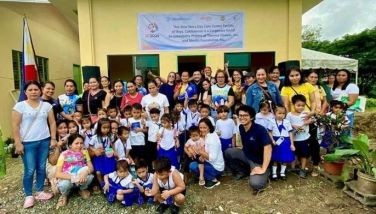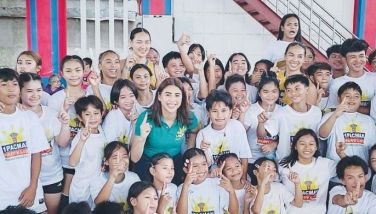Prepare your child for the K to 12 curriculum
MANILA, Philippines - This school year marks a milestone in the Philippine educational system as the Department of Education implements the K to 12 program. It is part of the continuing development to improve the Philippine education system.
In the K to 12 program, students in the basic education will undergo the K-6-4-2 model: Kindergarten, six years of elementary education (grades 1 to 6), four years of junior high school (grades 7 to 10) and two years of senior high school (grades 11 to 12). According to the Department of Education, the last two years in a student’s basic education allows specializations in science and technology, music and arts, agriculture and fisheries, sports, business, entrepreneurship, etc. This means that after learning all the essential skills and competencies, a student is allowed to discover his potential as an individual, in order for him to pick a course in college or a job in the workforce.
Many question why there is a need to extend the learning years. According to Education Secretary Armin Luistro, “extending the basic education until the 12th grade means spreading out the lessons. The focus of early education should be the fundamental skills and literacy of the pupils to develop better comprehension. This is beneficial for the student because he is given more time to master the important skills, therefore maximizing his potentials as a student.”
In line with this initiative, private schools are now making their adjustments in their curriculum to implement the program in their schools. Some of them even conducted bridging classes last summer to prepare the students for changes in the curriculum.
Investing on enrichment programs provides support to the growing needs of the students during this transitional stage. “Enrichment programs give students an opportunity to shine because they are able to learn at their own pace, in an environment that promotes a positive attitude towards studying,” explains Ma. Rowena Matti, CEO of Galileo Enrichment Learning Program.
The lessons provided by enrichment programs are based on the Philippine curriculum, but are enhanced and supplemented by the curriculum from other countries such as the US and Singapore. Enrichment programs get the best teaching strategies and concepts, and put them in a package that will create a student that is a cut above the rest.
“Assessment of skills learned and mastered is continuous, and students are moved up in school grade level when appropriate,” says Matti. Regular assessment allows the teacher to see if the student has mastered the important skills needed to advance to a higher level.
Through enrichment programs, transitioning from the old curriculum to the K to 12 curriculum will be smooth and coherent.
For more information, please call the Galileo head office at 8451234, or visit their website www.galileoenrichment.com
- Latest




























